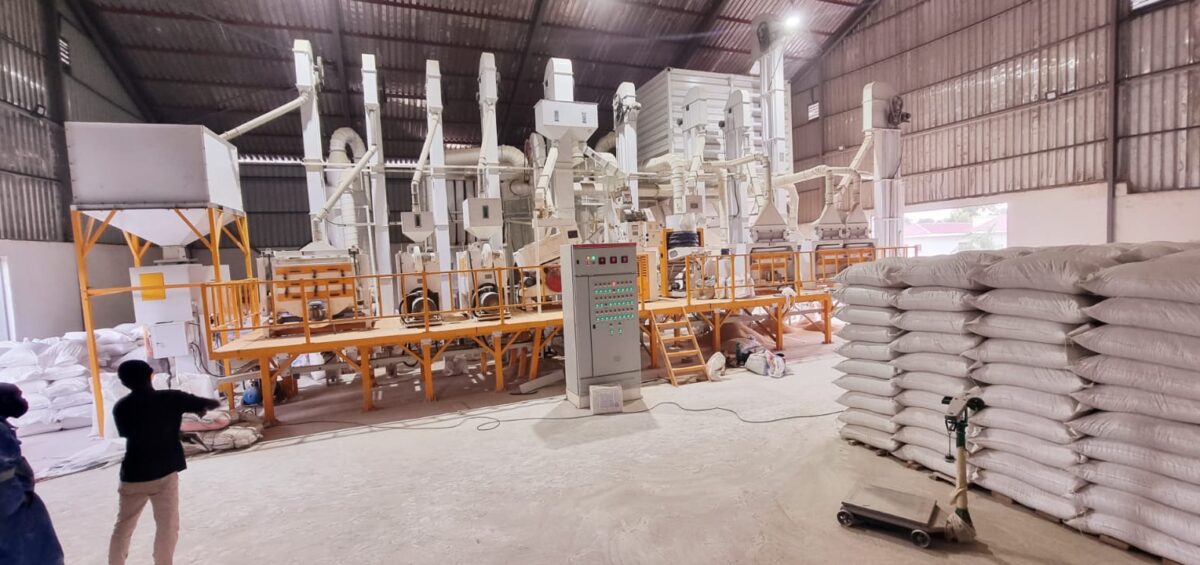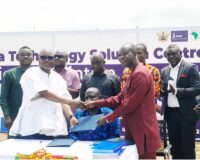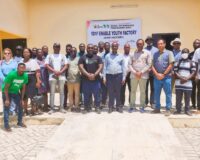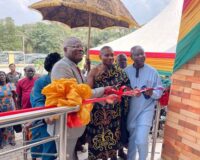In a quiet corner of the Bono Region, Ghana, a rice revolution is underway, breathing new life into local rice farming communities and a promise to change the lives of farmers and igniting hope in the hearts of these rural communities.
Nkrankwanta, the small district capital for the largely rural Dormaa West District is now the proud home of a state-of-the-art rice processing factory, sprouting from the seeds of an innovative initiative under the Rural Enterprises Programme (REP).
Guided by the vision of the Ministry of Trade and Industry, REP, embarked on this magnificent plan to empower rice farmers and revolutionize the region’s rice production under its innovative 1D1F Common User Facility (CUF) initiative, which seeks to empower agricultural value chain actors with limited financial means to own and operate their processing facilities.
The construction of the Nkrankwanta rice processing Common User Facility and installation of the processing plant was completed in July 2021 at the cost of GH¢7.243 million. Boasted with top-of-the-line milling and packaging machines, a standby generator to weather any power outages, and a mechanized borehole ensuring a steady supply of water to nurture the rice processing activities; this gleaming rice processing factory stands tall, like a beacon of hope in the “47,913 populated and mainly agrarian” Dormaa West district and beyond.
Gathered at the commissioning ceremony, a Deputy Minister of Trade and Industry, Michael Okyere Baafi, expressed heartfelt gratitude to the funding partners of REP, namely the African Development Bank (AfDB) and the International Fund for Agricultural Development (IFAD) for their invaluable support. He acknowledged that it was the financial backing of IFAD and AfDB that nurtured the REP’s One District One Factory (1D1F) initiatives, allowing it to commence and flourish.
“The 1D1F Common User Facility Initiative is a testament to our commitment to empower our agricultural communities,” Deputy Minister Baafi declared, with a sparkle of enthusiasm in his eyes. In contrast to the traditional 1D1F Program, where private sector promoters spearheaded the establishment of factories, the collaboration with IFAD and AfDB through the REP allowed the government to fund and establish factories for primary and secondary farmer-based organizations and the youth to own and manage. The essence of shared ownership and responsibility has never been more evident, as the Government retains only a 10% stake while the rest belongs to the farmers and the community.
The Nkrankwanta Rice Processing Factory was no exception. The rice farmers of Dormaa West Union of Rice Producers Association LBG were given a resounding 70% shareholding in the company, with the District Assembly and Traditional Council having 10% shares each.
“With this initiative, we are transforming the landscape of rice production in Ghana,” Mr. Baafi proclaimed proudly. “But this is just the beginning!”
Indeed, the REP’s efforts were not confined to Nkrankwanta alone. Four other Common User Facility factories have been built across the nation, focusing on different agricultural value chains, from rice and maize to oil palm. Additionally, 58 1D1F ENABLE Youth factories, smaller in size but equally full of potential, were being established, offering a bright future to the graduate youth of the nation.
Kwasi Attah-Antwi, the National Director of REP, expressed immense pride in the innovation achieved through the 1D1F CUF initiative. He recounted the significant role REP has played since its inception in 1995 to change the micro and small enterprises development landscape in Ghana with the introduction of district Business Advisory Centres (BACs) and Rural Technology Facilities (RTFs) in 161 districts. However, the realignment of REP in 2017, with the collaboration of the Ghana Government, IFAD, and AfDB, allowed for a new branch of innovation including the Common User Facilities.
District Chief Executive for Dormaa West, Francis Kwadwo Oppong, joyously hailed the factory’s impact on the local rice farmers. The burden of transporting rice for milling elsewhere had been lifted, and their crops no longer suffered the fate of being sold as paddy. Nkrankwanta’s fertile soil had become a sanctuary of hope and prosperity, evident in the beaming faces of rice farmers at the commissioning, who can now bid farewell to the ordeal of post-harvest losses. With ownership in the Nkrankwanta Rice Processing Factory Limited, they have gained not just a stake in the business but also newfound pride in their craft.
But the story of towards a flourishing rice factory doesn’t end with 12 farmer-based organisations (FBOs) which currently constitute the Dormaa West Union of Rice Producers Association. The REP invites new farmer-based organizations to join the collective efforts through the mother union, expanding the reach and impact of this groundbreaking initiative.
To ensure the smooth operation and sustainability of the factory, a Board of Directors has been inaugurated, representing various stakeholders, including the farmers, District Assembly, Traditional Council, Ministry of Trade and Industry, finance experts, entrepreneurship/business development specialists, and legal experts. It is chaired by Dr. Abdul Azziz, one of the 3 representatives of the farmers on the Board.
The rice revolution in the Bono Region of Ghana has just begun, and with it, the promise of a brighter and more prosperous future for all those whose hands toil the fertile lands. With determination in their hearts and the power of collective ownership, the farmers of Bono Region are sowing the seeds of progress, reaping the rewards of their labour, and growing together as a community, ready to embrace the opportunities that lie ahead.





